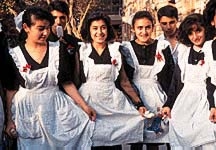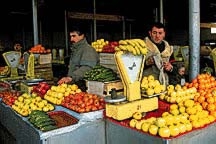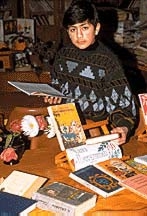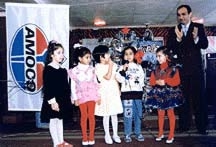|

Summer 1996 (4.2)
Pages 10-12
Baku Diary
Passport
to the World Market Economy
English Language
by Susan Cornnell
  Photo: A tradition among high school seniors
on the last day of school is to write autographs and messages
in pen on each other's white aprons. May 1995. Photo: Betty Blair. Photo: A tradition among high school seniors
on the last day of school is to write autographs and messages
in pen on each other's white aprons. May 1995. Photo: Betty Blair.
"Jingle Bells", that
all-time American Christmas favorite, was not quite what I had
expected to hear when I visited a group of Tibetan Refugees high
up in the Himalayan Mountains a few years ago. I remember thinking
to myself that English had truly become a global language if
it was possible to hear such songs in such a remote corner of
the world.
Well, Azerbaijan is not Nepal, and Baku has probably had an international
feel about it for centuries, given its unique geographical location
at the crossroads between Europe and Asia. But these days, English
is definitely part of the formula that Azerbaijanis are using
in their hot pursuit to enter the world market economy. Despite
the fact that Russian used to be the "lingua franca"
of Azerbaijan, these days an amazing transformation is taking
place in language usage. It's fair to say that English is well
on its way to becoming the prestige foreign language of the country.
Teachers of English are the best paid educators in town. They're
in such demand that they can even afford to turn away students
despite the severe economic crisis that the country is going
through.
 Right: Language learning often requires
different Right: Language learning often requires
different  concepts
not just different words. Azeris still shop at central markets.
Supermarkets are just beginning to open. concepts
not just different words. Azeris still shop at central markets.
Supermarkets are just beginning to open.
As an American, I was privileged
to be among the very first native speakers of English to arrive
in Azerbaijan back four years ago. I'll never forget how it all
began on a hot summer day. It was July 1992, and I had just landed
in Azerbaijan, ever so proud of my newly-acquired certificate
in TEFL (Teaching English as a Foreign Language).
The moment of truth had arrived to transform theory into practice.
My first experience in teaching English came 24 hours after I
landed when I suddenly found myself in front of a group of Azeri
women of various ages, various educational backgrounds and varying
experiences of learning any foreign language.
But the day was so miserably hot-it was a scorcher and we were
packed into this medium-sized room, a Soviet-style "resort"
in Zagulba on the Caspian Sea, not far from Baku. The only thing
I could think about was how to escape the infernal heat. Making
hand motions like someone swimming, I pointed to my watch, flashed
ten fingers and the next thing you knew, we were splashing in
the sea in cool retreat.
The words, "bathing suit", "swim", and "splash"
may not be typical words to introduce a foreign language, but
I can tell you it broke the barriers between teacher and student,
foreigner and native, American and Azeri. That simple gesture-an
escape from the heat-opened the door for a fun-loving relationship
and helped reduce many of the traditional fears students usually
associate with acquiring a second language.
Years of Soviet-style pedagogy had caused people to expect that
learning a language had to be pure drudgery and tedium-just like
some people think exercise doesn't count unless it's painful.
Concentration on rules of grammar, endless conjugations, and
mindless repetitive drills had squeezed much of the joy out of
learning. I found my students were used to endless classroom
exercises using outdated, poorly printed texts, which robbed
English of much of its vitality and vibrancy.
And don't forget, students in Azerbaijan during the Soviet period
rarely got a chance to interact with native speakers. I've even
heard of English language professors who had studied 25 years
before ever getting the chance to try out their verbal skills
directly with a native speaker. It wasn't that uncommon for some
of the determined professors to have become quite proficient
and fluent in English without ever having spoken to a native
speaker at all.
  Keen Interest in English Keen Interest in English
Times are rapidly changing
in Baku and interest in learning English is at an all-time high
as Azerbaijan reaches out to the international community in culture,
education, and trade. Students are highly motivated. I've seen
young guys carrying Russian-English dictionaries everywhere they
go, tucked into their pants' waistbands.
For the first time in history, a comprehensive 45,000 term dictionary
between Azerbaijani and English is about to go to press. Prior
to that, all Azerbaijanis who wanted to learn English had to
master Russian first as there were so few materials to support
their language learning efforts directly from Azerbaijani. Students
are eager to strike up conversations, even with total strangers
on the street especially if they just happen to look like foreigners
who might know English.
Of course, Hollywood and pop music pump out their messages in
English challenging young people to learn even faster. Even the
youngest child has picked up a few words. I can't tell you the
number of times during the three years that I lived in Baku that
someone called out to me on the street, "I love you!"
Unfortunately, the blood 'n' guts Stallone or Schwarzenegger
films have introduced another category of less than choice words
and phrases. Let's not talk about those.
The opportunities for native speakers of English to teach in
Azerbaijan are limitless and parents make a great sacrifice for
their children as they realize the best-paying jobs in town are
awarded to those who are fluent not only in Russian and Azerbaijani,
but in English, too. The majority of Baku residents are already
bi-lingual. You'd be surprised how many government workers, journalists
and diplomats are struggling to master irregular verbs as they
tackle yet another language.
Having taught English to Azerbaijanis, aged 3 to 60, naturally
I've accumulated a lot of stories. Once I was teaching the precocious
3 1/2 year old daughter of an international diplomat who insisted
that she already knew her alphabet and didn't need me to teach
it to her. "But, Miss Susan, I already can make all my big
letters!" Sitting perched at the head of a long mahogany
table, a TV, linked to a satellite dish, droned on at the other
end of the room. And so with determination, she started writing,
"A...B...CNN" (Cable News Network logo). With that,
she promptly lost interest, announcing that it was time to talk
about cats and dogs.
And then there was the time in one of my advanced level adult
classes that I decided to use baseball terms to illustrate cardinal
numbers. I drew a baseball diamond on the board and said, "Okay,
here's home plate. So where's first base?" Twenty-five students
stared at me as though I was babbling in ancient Sanskrit. Clearly,
I learned there's such a thing as "language" and another
thing quite different when it comes to "cultural experience"
or "cultural exposure". No doubt, these students could
have taught me a thing or two, however, had we brought up the
subject of soccer.
Many young engineers from foreign countries study at Baku State
University and Azerbaijan's Oil Academy. One such student was
Kammarphone from Laos. On one of the tests I gave him, he really
got tripped up. It asked seemingly simple items such as: "My
name is __" "I live at:__" "My phone is:__".
However, due to the nature of his name, he got confused and wrote,
"I AM a phone." What could I say? He passed!
  Photo: Children from the Youth Center,
"Kaynat" in Baku participated in a oral competition
entitled, "We Learn English," sponsored by Amoco .
Forty-five students between the ages of 8 to 15 spoke about "My
Family," "My Country," and "I Know America."
Rahif Rasulzade, Chairman of Kaynat applauds the young people's
efforts. Photo: Children from the Youth Center,
"Kaynat" in Baku participated in a oral competition
entitled, "We Learn English," sponsored by Amoco .
Forty-five students between the ages of 8 to 15 spoke about "My
Family," "My Country," and "I Know America."
Rahif Rasulzade, Chairman of Kaynat applauds the young people's
efforts.
Many of my adult students went
on to become English teachers themselves and were delighted when
I would visit their classrooms. "High five, Miss Susan!"
chirped twenty 8-year-olds. "Catch ya later!" Certainly,
I was influencing English acquisition more than I ever dreamed.
To this day, my students write me letters here in America: "I
wanna go..." and "I gotta get..." which originated
from one of their favorite classes using "Jazz Chants"
with "wanna, gonna, oughta, gotta." They had learned
textbook English long enough-they wanted to know how Americans
really speak.
My students' vocabulary became peppered with "boogie board"
and "out in the boonies." The lesson that set them
all awonder was the one about grocery stores-at that time a relatively
little known concept in Azerbaijan (though today, small supermarkets
are popping up throughout the city). "Shrink-wrap packaging,"
"bar codes," "Zip-locs," and "peanut-butter"
were curious concepts to students who had grown up shopping for
the best nature had to offer in open-air bazaars. Bread that
could last a month because it was pumped and puffed up with "preservatives"
was beyond their imaginations! Going to the corner bakery and
getting bread still hot from the oven is a daily fact of life
in Baku.
Few students had ever had the chance to listen to language cassette
tapes. Nevertheless, I found that students' pronunciation tended
to be somewhat British with a decidedly Russian accent. My American
accent further confounded them, especially on occasions when
I referred to words like "skeh-jul" (schedule) instead
of "shedj-jul" or "truck" instead of "lorry."
At the newly established Baku International School (Grades 1-8),
my students had learned English from their native Russian-speaking
teacher and said "lee-tul," for "little."
Their British instructors had then prodded them to enunciate,
"lit-tul." Then I came along and introduced "lid-dul."
Poor little nine-year-old Sevinge used to struggle through all
three pronunciations-"lee-tul," "lit-tul,"
"lid-dul"-whenever she wanted a simple drink of water!
Teaching English in Baku taught me a great many things as we
exchanged not only language but culture. I felt it was my responsibility
to represent the best of America as if I were a "Mini-Ambassador."
As only a handful of my students had even traveled beyond the
borders of Azerbaijan, there was many a giggle and gasp in response
to my description of life back in the USA. Many had impressions
born of Hollywood fantasies, or perhaps worse, Soviet propaganda.
Maybe the portrait I painted erred on the side of Norman Rockwell*.
But I believe it's a side that still exists in America and I'm
proud of it.
Both teacher and student tended to share with each other the
best of our countries, acknowledging the condition of the world
today, but focusing on the things we considered more noble. I
became endeared to my students through aspects of cultural life
and traditions that I discovered in those classes and, likewise,
I think it's fair to say that the Azerbaijani students gained
a greater admiration for my country, too.
* Norman
Rockwell was an American painter, very popular in the 40s and
50s, who painted portraits that depicted life as sweet, good
and simple.
Susan Cornnell has been writing this column since September
1993. Browse through her articles in past issues on the Internet.
From Azerbaijan International (4.2) Summer 1996
© Azerbaijan International 1996. All Rights Reserved.
Back to Index
AI 4.2 (Summer 1996)
AI Home
| Magazine
Choice
| Topics
| Store
| Contact
us
|


 Right: Language learning often requires
different
Right: Language learning often requires
different 
